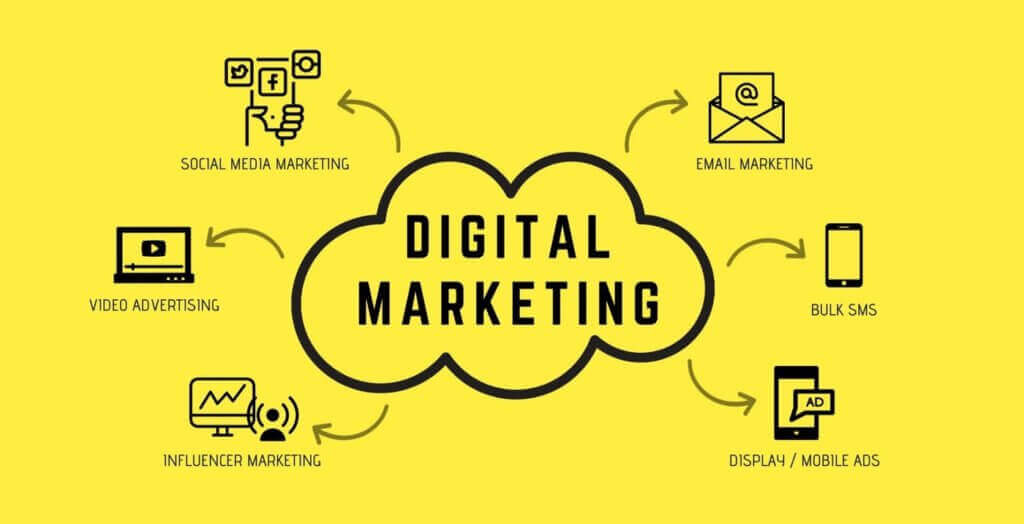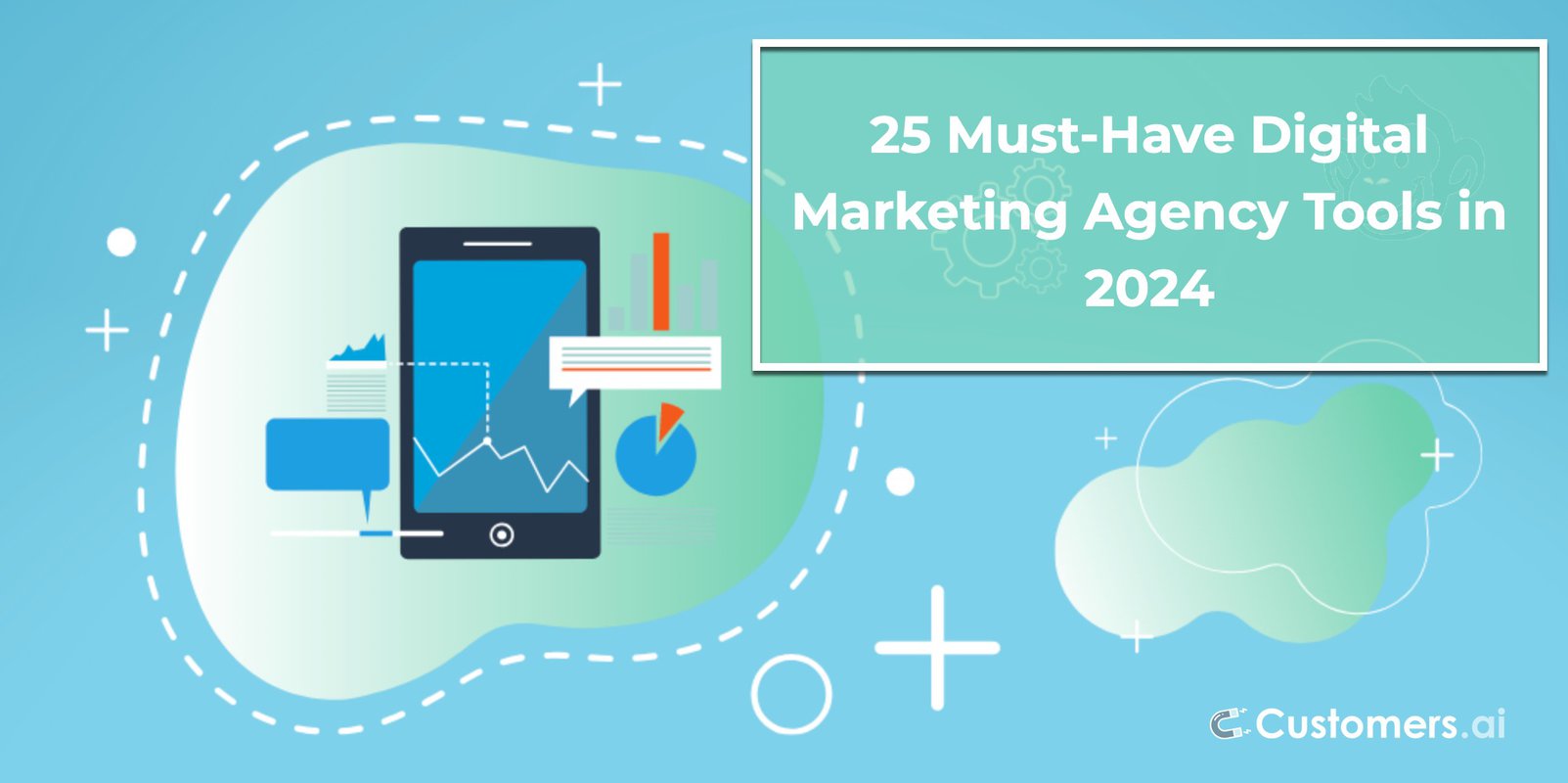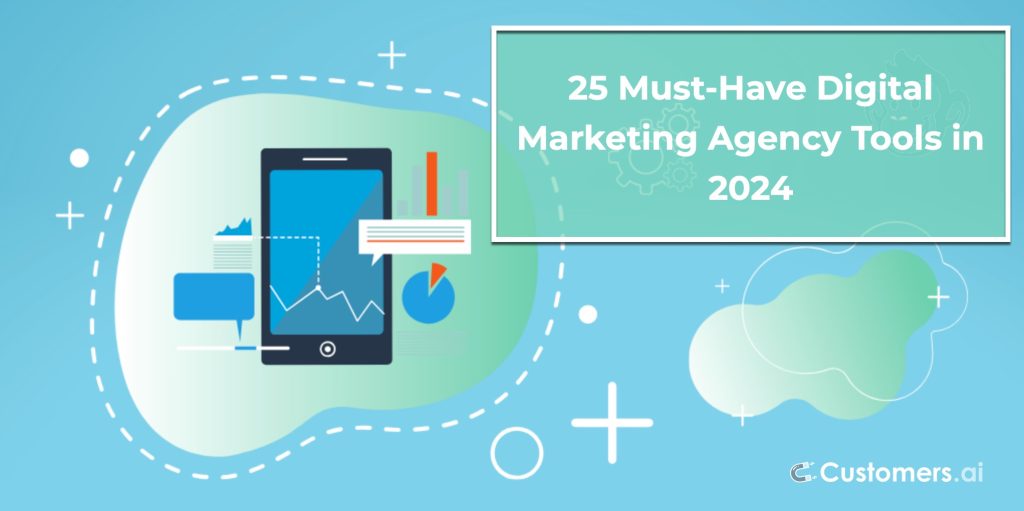Tools for Digital Marketing Agency? Digital marketing agencies need the right tools to succeed. These tools make tasks easier and results better.
Running a digital marketing agency is no small feat. From managing social media accounts to analyzing data, the range of tasks can be overwhelming. The right tools can simplify these tasks and boost productivity. They help agencies track performance, manage campaigns, and communicate effectively.
Having the best tools is crucial for staying ahead in the competitive digital landscape. This blog will introduce essential tools that every digital marketing agency should consider. Whether you are a small startup or a large firm, these tools can make a difference. Read on to discover how you can enhance your agency’s efficiency and success.
Introduction To Digital Marketing Tools
Digital marketing tools are essential for any agency aiming to succeed in the competitive online space. These tools help streamline processes, manage campaigns, and analyze data. They make it easier to reach your target audience effectively. From social media management to SEO, there is a tool for every aspect of digital marketing.
Importance Of Tools
Digital marketing tools play a crucial role in improving efficiency. They save time and effort by automating repetitive tasks. This lets your team focus on strategy and creativity. These tools also provide valuable insights through data analytics. Understanding your audience’s behavior is key to refining your marketing strategies.
Another benefit is the ability to track progress in real-time. You can adjust campaigns on the go, ensuring better results. Digital marketing tools also help in managing multiple platforms from one place. This unified approach ensures consistency across all channels.
Choosing The Right Tools
Choosing the right tools is vital for your agency’s success. Start by identifying your needs. Do you need help with social media, email marketing, or SEO? Different tools serve different purposes.
Budget is another factor to consider. Some tools offer free versions with limited features. Others require a subscription. Make sure the tool you choose fits your budget and meets your needs.
Ease of use is also important. A tool might have great features, but if it’s too complex, it won’t be effective. Look for tools with user-friendly interfaces and good customer support.
Here’s a table to help you understand some popular digital marketing tools and their uses:
| Tool | Purpose |
|---|---|
| Hootsuite | Social Media Management |
| MailChimp | Email Marketing |
| Google Analytics | Data Analytics |
| SEMrush | SEO and Competitive Research |
| Canva | Graphic Design |
Choosing the right tools can significantly impact your digital marketing success. Carefully evaluate your needs and budget before making a decision.

Credit: scaletime.co
Content Management Systems
In the digital marketing realm, Content Management Systems (CMS) play a vital role. A CMS allows businesses to create, edit, and manage digital content efficiently. It simplifies the process of maintaining a website, even for non-technical users. With a CMS, updating your website becomes a breeze, ensuring that your online presence remains fresh and engaging.
Popular Cms Options
Choosing the right CMS is crucial for your digital marketing success. Here are some popular options:
- WordPress – Known for its flexibility and extensive plugin library.
- Joomla – Offers robust features for developers and large websites.
- Drupal – Preferred for its high security and scalability.
- Squarespace – Ideal for small businesses needing beautiful design templates.
- Wix – User-friendly with drag-and-drop functionality.
Benefits Of Using A Cms
Using a CMS offers numerous advantages for digital marketing agencies:
- Ease of Use – Non-technical users can update content without coding skills.
- SEO-Friendly – Many CMS platforms have built-in SEO tools.
- Cost-Effective – Reduces the need for a dedicated web developer.
- Scalability – Easily manage large volumes of content.
- Collaboration – Multiple users can work on content simultaneously.
Here’s a quick comparison of some popular CMS options:
| CMS | Key Features | Best For |
|---|---|---|
| WordPress | Flexibility, Plugins, SEO Tools | All Businesses |
| Joomla | Advanced Features, Multilingual Support | Large Websites |
| Drupal | Security, Customization | High-Traffic Sites |
| Squarespace | Design Templates, User-Friendly | Small Businesses |
| Wix | Drag-and-Drop, Templates | Beginners |
Incorporating a CMS into your digital marketing strategy can streamline your workflow. It can also enhance your website’s functionality, helping you achieve your marketing goals more efficiently.
Seo Tools
SEO tools are essential for any digital marketing agency. They help improve a website’s visibility on search engines. By using these tools, agencies can optimize content, analyze performance, and stay ahead of the competition. Below are some of the most important SEO tools for digital marketing agencies.
Keyword Research
Keyword research is the foundation of any successful SEO strategy. It helps identify the terms people use to search for products or services. Here are some popular keyword research tools:
- Google Keyword Planner: Free tool to find keyword ideas and trends.
- SEMrush: Offers in-depth keyword analysis and competitor insights.
- Ahrefs: Provides keyword difficulty scores and search volume data.
- Ubersuggest: Simple tool for discovering new keywords and content ideas.
Site Audit Tools
Site audit tools help identify technical issues that affect a website’s performance. They check for broken links, slow loading times, and other problems. Here are some reliable site audit tools:
- Screaming Frog: Crawls websites to find SEO issues and generate reports.
- Google Search Console: Monitors site performance and alerts for errors.
- SEMrush Site Audit: Analyzes websites and provides actionable insights.
- Ahrefs Site Audit: Detects technical SEO issues and suggests improvements.
Using these tools, digital marketing agencies can enhance their SEO strategies. They provide valuable insights and help optimize websites for better search engine rankings.

Credit: customers.ai
Social Media Management
Managing social media is crucial for digital marketing agencies. It involves creating, scheduling, and analyzing content across various platforms. Effective social media management helps in engaging with the audience, building brand awareness, and driving traffic. Below are some essential tools for social media management.
Scheduling Posts
Scheduling posts is vital for maintaining a consistent online presence. Tools like Buffer, Hootsuite, and Later allow you to plan and schedule your social media posts. These tools help in:
- Saving time by automating post publishing.
- Ensuring posts go live at optimal times.
- Managing multiple accounts from a single dashboard.
With these tools, you can focus on creating engaging content while the tool handles the posting schedule.
Analytics And Reporting
Analytics and reporting tools are essential for measuring the success of your social media campaigns. Tools such as Sprout Social, Google Analytics, and Socialbakers offer detailed insights. These tools provide:
- Data on post engagement and reach.
- Information on audience demographics.
- Reports on the best-performing content.
Using these insights, you can refine your strategy, target the right audience, and improve your content.
Email Marketing Platforms
Email marketing platforms are essential for digital marketing agencies. They help manage and optimize email campaigns. These tools save time and improve efficiency. Using email marketing platforms, agencies can reach their audience effectively. Below are key features to look for in these platforms.
Automation Features
Automation features simplify repetitive tasks. They allow you to schedule emails in advance. This ensures timely delivery of your messages. Automation can also segment your audience. You can send personalized emails to different groups. This increases engagement and conversions.
Another benefit is triggered emails. These emails are sent based on user actions. For example, a welcome email after sign-up. Or a reminder email for an abandoned cart. These triggers keep your audience engaged.
Template Design
Template design is crucial for email marketing. It impacts the look and feel of your emails. Good templates are visually appealing and easy to read. They should also be mobile-friendly. Many email marketing platforms offer pre-designed templates. You can customize these templates to fit your brand.
Drag-and-drop editors are also available. These tools make it easy to design emails. You do not need coding skills. Simply drag elements into place. Add text, images, and buttons with ease. This ensures your emails are both beautiful and functional.
| Feature | Benefit |
|---|---|
| Automation | Saves time and increases efficiency |
| Segmentation | Allows personalized email campaigns |
| Triggered Emails | Keeps audience engaged based on actions |
| Template Design | Enhances visual appeal and readability |
| Drag-and-Drop Editor | Easy email design without coding |
These features make email marketing platforms indispensable. They enhance the efficiency and effectiveness of your campaigns. Choose a platform that offers robust automation and design tools.
Analytics And Reporting Tools
Analytics and reporting tools are essential for any digital marketing agency. These tools help track performance, generate reports, and provide insights. By using these tools, agencies can make data-driven decisions and improve their strategies. This section will cover two important aspects: tracking performance and generating reports.
Tracking Performance
Tracking performance is crucial for any marketing campaign. It helps you understand what works and what doesn’t. Google Analytics is one of the most popular tools for this purpose. It provides detailed insights into website traffic, user behavior, and conversion rates.
- Page Views: Monitor how many times a page is viewed.
- Session Duration: See how long users stay on your site.
- Bounce Rate: Track the percentage of visitors who leave after viewing one page.
Other tools like SEMrush and Ahrefs also offer performance tracking features. These tools help you analyze keyword rankings and backlinks, providing a comprehensive view of your SEO efforts.
Generating Reports
Generating reports is an essential task for digital marketing agencies. Reports provide a clear picture of campaign performance. They help you communicate results to clients effectively. Google Data Studio is a great tool for creating customized reports.
- Data Integration: Easily pull data from various sources.
- Custom Dashboards: Create dashboards that highlight key metrics.
- Interactive Reports: Make reports interactive for better engagement.
Other tools like HubSpot and Zoho Analytics also offer robust reporting features. They allow you to generate detailed reports that can be shared with clients. These tools make it easy to track KPIs and measure the success of your campaigns.
To summarize, analytics and reporting tools are indispensable for digital marketing agencies. They help track performance and generate insightful reports, enabling better decision-making.
Customer Relationship Management (crm)
Customer Relationship Management (CRM) tools are vital for any digital marketing agency. These tools help manage interactions with current and potential customers. They also enhance efficiency and boost sales. Let’s explore key features of CRM tools.
Managing Contacts
Keeping track of customer details can be overwhelming. A CRM helps by storing all contact information in one place. This includes names, addresses, emails, and phone numbers. It also keeps notes on each interaction. This ensures your team always has up-to-date information.
CRM tools can also segment contacts. This means you can group customers based on various criteria. For example, location, purchase history, or engagement level. This helps in targeting specific groups with tailored marketing campaigns.
Sales Pipeline Tracking
Tracking the sales pipeline is crucial for any agency. A CRM provides a clear view of where each lead is in the sales process. It shows stages like initial contact, follow-up, negotiation, and closing. This helps your team focus on leads that are most likely to convert.
Most CRM tools offer visual dashboards. These dashboards display the sales pipeline in an easy-to-understand format. You can see which deals are in progress and their potential value. This helps in forecasting future sales and making informed decisions.
| Feature | Benefit |
|---|---|
| Contact Management | Centralized customer information |
| Segmentation | Targeted marketing campaigns |
| Sales Pipeline Tracking | Improved lead management |
| Visual Dashboards | Easy-to-understand sales data |
- Contact Management: All customer details in one place.
- Segmentation: Group customers for targeted marketing.
- Sales Pipeline Tracking: Monitor lead progress.
- Visual Dashboards: Clear view of sales data.
Using a CRM tool can streamline your customer management. It helps in improving customer relationships. It also boosts your team’s efficiency. This ultimately leads to increased sales and growth for your agency.
Graphic Design Tools
Graphic design tools are essential for digital marketing agencies. They help create visually appealing content, enhance branding, and communicate effectively with the audience. Choosing the right tools can significantly impact your agency’s productivity and creativity.
Creating Visual Content
Creating visual content is a critical aspect of digital marketing. Tools like Adobe Photoshop and Canva are popular choices for graphic designers.
- Adobe Photoshop: Known for its advanced features, it allows detailed image editing and manipulation.
- Canva: User-friendly and ideal for quick designs. It offers templates, drag-and-drop features, and easy sharing options.
Other tools like Illustrator and Sketch are also useful. They help in creating vector graphics and illustrations. These tools are perfect for logos, icons, and other scalable designs.
Collaboration Features
Collaboration is vital for any digital marketing agency. Tools with collaboration features can streamline the design process.
| Tool | Collaboration Features |
|---|---|
| Figma | Allows real-time collaboration. Multiple team members can work on the same design simultaneously. |
| Adobe XD | Offers shared links for feedback and co-editing capabilities. |
These tools facilitate better communication and reduce the time spent on revisions. They also help keep everyone on the same page, ensuring consistency and efficiency in the design process.
Project Management Tools
Project management tools are essential for digital marketing agencies. They help in organizing tasks, ensuring efficient team collaboration, and streamlining processes. These tools are designed to handle multiple projects simultaneously, keeping everything on track. Below, we explore two key aspects of project management tools: Task Management and Team Collaboration.
Task Management
Task management is critical in a digital marketing agency. It involves creating, assigning, and tracking tasks to ensure project completion on time. Key features include:
- Task Creation: Easily create tasks with detailed descriptions.
- Assignment: Assign tasks to specific team members.
- Deadlines: Set due dates to ensure timely completion.
- Progress Tracking: Monitor the progress of each task.
Popular task management tools include Asana, Trello, and Monday.com. These tools offer intuitive interfaces and powerful features to keep your projects organized.
Team Collaboration
Team collaboration is vital for the success of any project. Effective communication and information sharing can enhance productivity. Key features include:
- Real-Time Communication: Tools like Slack enable instant messaging.
- File Sharing: Share documents and files easily.
- Commenting: Leave comments on tasks for better clarity.
- Video Conferencing: Tools like Zoom facilitate virtual meetings.
Effective team collaboration tools ensure that everyone is on the same page. They help in avoiding misunderstandings and keeping the team aligned with project goals. Popular tools for team collaboration include Slack, Microsoft Teams, and Google Workspace.
| Tool | Key Features |
|---|---|
| Asana | Task creation, assignment, deadlines, progress tracking |
| Trello | Visual boards, task assignment, progress tracking |
| Monday.com | Customizable workflows, task management, automation |
| Slack | Real-time communication, file sharing, integrations |
| Microsoft Teams | Collaboration, video conferencing, file sharing |
| Google Workspace | Email, document sharing, collaboration |
Conclusion And Final Thoughts
In the fast-paced world of digital marketing, tools are essential. They help optimize processes, save time, and drive results. With the right tools, agencies can streamline their operations and deliver better outcomes for clients. This section covers future trends and final recommendations for digital marketing tools.
Future Trends
Artificial Intelligence (AI) is becoming a game-changer in digital marketing. Tools powered by AI provide insights and automate tasks. This helps in creating personalized experiences for users.
Voice Search Optimization is another emerging trend. As more people use voice assistants, optimizing for voice search will be crucial. Tools that analyze and optimize content for voice search will become popular.
Social Media Management tools are evolving. They now offer advanced analytics and scheduling features. These tools help marketers understand their audience better and plan effective campaigns.
Final Recommendations
Choosing the right tools depends on your agency’s needs. Here are some recommendations to consider:
- Analytics Tools: Use tools like Google Analytics and SEMrush for data insights.
- SEO Tools: Tools like Ahrefs and Moz help in keyword research and link building.
- Content Management: Platforms like WordPress and HubSpot simplify content creation and management.
- Social Media Tools: Tools like Hootsuite and Buffer for scheduling and managing posts.
- Email Marketing: Use tools like Mailchimp and Constant Contact for email campaigns.
Regularly update your toolset to stay ahead of the competition. Evaluate new tools and integrate them into your workflows. This ensures your agency remains efficient and effective.

Credit: customers.ai
Frequently Asked Questions
What Are The Best Tools For Digital Marketing?
The best tools for digital marketing include Google Analytics, Hootsuite, SEMrush, and MailChimp. These tools help with analytics, social media management, SEO, and email marketing.
How Can I Improve Seo With Digital Tools?
Improve SEO with tools like SEMrush and Ahrefs. These tools offer keyword research, backlink analysis, and competitive insights to boost rankings.
Which Social Media Tools Are Essential?
Essential social media tools include Hootsuite and Buffer. They help schedule posts, analyze performance, and manage multiple accounts efficiently.
What Tools Help With Email Marketing?
Tools like MailChimp and Constant Contact are great for email marketing. They provide templates, automation, and detailed analytics to track success.
Conclusion
Digital marketing tools enhance efficiency and success. Choose tools that fit your needs. Explore options to find what works best for your agency. Stay updated with the latest trends and technologies. Use analytics to measure and improve your strategies. Remember, the right tools can make a big difference.
Adapt and grow your digital marketing efforts. Keep learning and improving for better results. Digital marketing is always evolving. Stay proactive and keep your agency competitive.

